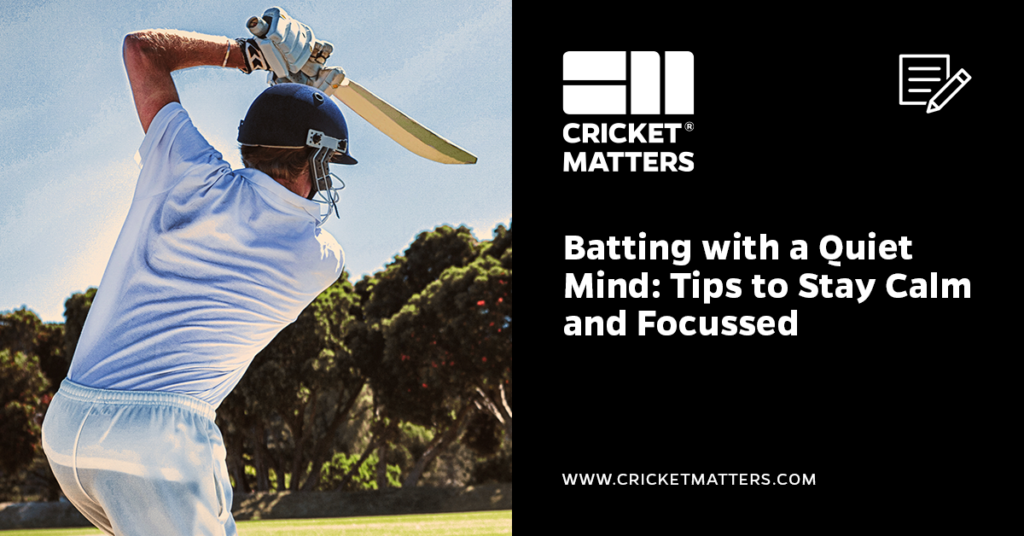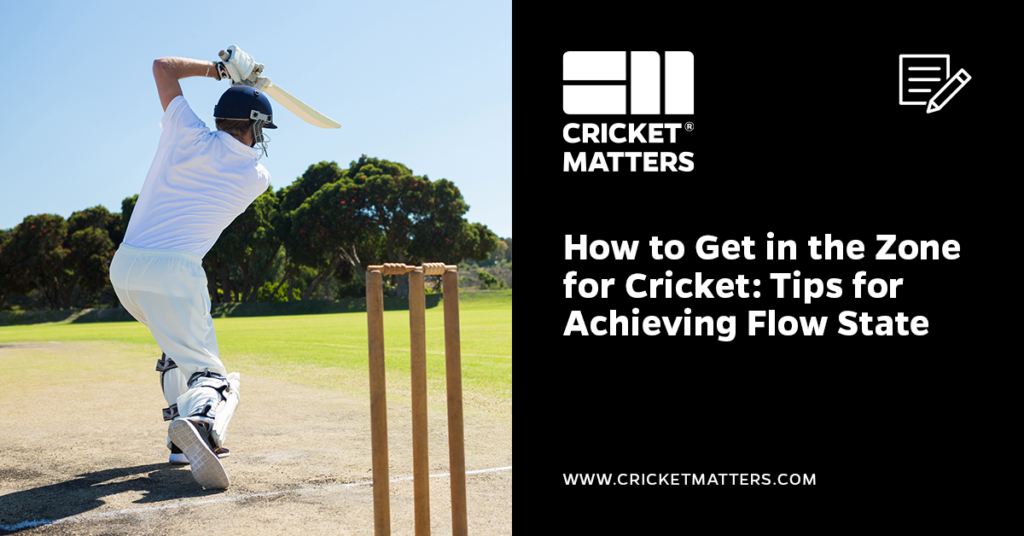
I hope you enjoy reading this blog post.
James Breese, Cricket Matters FounderIf you need my help with cricket coaching, strength and conditioning, injury rehab, or nutrition, click here.
Mental fitness is a crucial component of cricket, influencing a player’s ability to perform under pressure, maintain focus, and make strategic decisions.
Players’ mental stamina and resilience are as important as their physical skills in a sport where games can last several hours or even days.
However, this aspect of the game is often overlooked. In fact, from my experience, it’s completely neglected, particularly at the amateur level.
Improving your mental fitness and strength helps cricketers stay calm, composed, and effective, particularly in high-pressure situations.
Enter meditation.
Meditation offers numerous benefits for cricketers, enhancing both mental and physical aspects of performance. I wish I had discovered this sooner in my career.
Regular practice can improve concentration, reduce anxiety, and better stress management.
Meditation also promotes emotional stability, helps in recovery, and can enhance overall well-being.
By integrating meditation into their routine, cricketers can achieve a state of mental clarity and resilience, allowing them to perform at their best consistently.
So, let’s dive in and explain how to get started.
Table of Contents
What is Meditation?

Meditation is the practice of deliberately spending time with our minds, taking a break from our busy days to sit, breathe, and focus on our breath.
This practice helps us become more aware of our thoughts, act compassionately toward ourselves and others, and connect with the present moment.
People often think meditation means sitting in silence and stopping all thoughts and feelings to achieve calmness.
However, meditation is not about stopping thoughts but letting them come and go.
Imagine thoughts as continually moving traffic in the mind. Sometimes, we chase after a flashy car, much like getting caught up in analyzing or judging a thought.
Other times, we resist a roadblock, like avoiding uncomfortable thoughts or feelings.
Meditation trains us to observe this traffic without chasing or resisting it, gently shifting our focus to our breath.
With regular practice, we learn to see thoughts for what they are: just thoughts.
This makes it easier to let them go and “get out of our heads,” allowing us to engage more in activities, whether spending time with family, practising self-care, or working under a deadline.
What Does Meditation Do?
Life often presents us with difficulties, stress, and challenges.
While we can’t control these external events, we can change how we respond.
This requires awareness of our thoughts, feelings, and behaviours and compassion to connect with ourselves and others.
Meditation helps us create the conditions for seeing things more clearly, feeling calmer, and acting kindly toward ourselves and others.
It’s not about achieving immediate clarity or calmness but about learning to be comfortable with our mind as it is.
Meditation involves slowing down, checking in with ourselves, and practising kindness towards our minds, regardless of the current state of our thoughts and feelings.

Have You Downloaded Our FREE 7-Day Gym Workout Plan?
Grab your complete step-by-step 7-day gym workout plan for cricketers today. There will be no more Guesswork. Just follow the plan and get results.
Why Meditation is Essential for Cricketers

Meditation offers cricketers a powerful tool to enhance their mental and physical performance.
By cultivating regular meditation, players can significantly improve their focus and concentration, reduce stress and anxiety, and optimise their overall performance and recovery.
These benefits are critical in a sport that demands prolonged mental and physical exertion.
Understanding the importance of meditation can help cricketers maintain their composure, make better decisions, and recover more effectively, ultimately improving their performance on the field.
It does this threefold:
#1 – Enhanced Focus and Concentration
In cricket, maintaining focus for extended periods is crucial. Meditation trains the mind to stay present and concentrated, helping cricketers sharpen their focus during matches and practice sessions.
This heightened concentration enables players to make better decisions, react swiftly, and stay engaged throughout the game.
#2 –Reduced Stress and Anxiety
Cricket can be mentally demanding, with high expectations and intense pressure.
Meditation helps manage stress and anxiety by promoting relaxation and emotional balance.
Regular meditation reduces stressors’ impact, allowing players to remain calm and composed, even in high-pressure situations.
#3 -Improved Performance and Recovery
Meditation enhances overall athletic performance by improving mental clarity and resilience.
It also aids in faster recovery by reducing muscle tension and promoting restful sleep.
By incorporating meditation into their routine, cricketers can optimise their mental and physical health, leading to consistent and improved performance on the field.
Research and Evidence on Meditation in Sports

There was a time when I thought meditation was some mumbo-jumbo thing monks do.
Never have I been so wrong.
Scientific research has increasingly highlighted the benefits of meditation for athletes, including baseball players.
These studies provide valuable insights into how meditation can improve mental and physical aspects of athletic performance, underscoring its relevance for cricketers.
Psychological Skills Training and Mindfulness
A study on NCAA Division I collegiate baseball players by Željka Vidić and N. Cherup (2021) demonstrated the significant impact of a six-session integrated Psychological Skills Training (PST) and mindfulness intervention.
The findings revealed reduced stress levels and increased resilience, coping skills, mindfulness, and flow among the players.
Participants also expressed positive perceptions of the intervention, noting its applicability to baseball and other areas of their lives.
Mindfulness-Based Interventions for High School Baseball Players
Blake Costalupes and colleagues (2021) conducted a pilot study involving high school baseball players using a smartphone mindfulness-based intervention.
The study showed mindfulness training facilitated mental preparation for competition and enhanced self-confidence.
Given the athletes ‘ busy schedules, the intervention’s convenience and effectiveness were particularly appreciated.
Flow State and Mental Health
Research by Jian-Hong Chen et al. (2018) on Taiwanese amateur baseball players found that a four-week mindfulness training programme significantly enhanced the players’ flow state, cognitive anxiety, and competitive state anxiety.
Additionally, the study reported improvements in global eating disorder concerns, sleep disturbances, and other mental health aspects, indicating a strong association between mindfulness and improved athletic performance.
General Benefits of Meditation
A systematic review and meta-analysis by Madhav Goyal et al. (2014) provided moderate evidence that mindfulness meditation programmes improve anxiety, depression, and pain, with low evidence for reducing stress and enhancing mental health-related quality of life.
Although these findings are not specific to baseball, they underscore the general mental health benefits that can support athletic performance across various sports, including cricket.
According to research, meditation, particularly mindfulness-based interventions, shows promise in enhancing psychological resilience, reducing stress, and improving overall mental health, which is critical for optimal baseball performance.
These benefits extend beyond the sport, impacting various aspects of athletes’ lives.
As a result, if we’re to further the sport of cricket, more research should be done on cricketers.
What Happens While Meditating?

During meditation, it’s normal to experience a variety of thoughts and sensations. Here’s what to expect:
Mind Wandering
Your mind will wander, even for experienced meditators.
This is natural, as the mind is always active. The key is gently bringing your focus back to your breath whenever you get distracted. Over time, this will help reduce distractions.
Feeling Nothing
Sometimes, you might feel like nothing is happening. This doesn’t mean you’re doing it wrong. Meditation is about taking care of your mind, so keep practising consistently.
Emotional Responses
Emotions such as impatience, irritability, or sadness may arise.
This is normal when slowing down and giving space to your feelings. Observe these emotions without pushing them away and notice how they manifest in your body. Use your breath to ease any tension.
Fidgeting
Sitting still can be challenging, leading to fidgeting. Treat this like distracting thoughts: notice it, let it go, and return your focus to your breath.
Trying Too Hard
Meditation requires a balance of effort and relaxation. Like sleep, the harder you try to meditate, the more elusive it can become. Instead of forcing your mind to be empty, allow it to relax naturally.
Further Reading
Getting Started: Meditation for Cricketers

Beginning a meditation practice can be simple and rewarding for cricketers.
Here are my eleven essential steps and tips to help you get started:
#1 – Finding a Quiet Space
Choose a location where you can sit undisturbed for your meditation.
This could be a quiet room, a garden, or any place where you feel calm and comfortable.
Many people find it helpful to meditate in bed, either first thing in the morning or last thing at night.
#2 – Getting Comfortable
Sit or lie down in a comfortable yet alert position. You can sit on a chair, a cushion, or the floor.
Ensure your back is straight to facilitate better breathing.
#3 – Setting a Timer
Start with a manageable duration, such as 5 to 10 minutes.
Use a timer to avoid checking the clock, allowing you to immerse yourself in the practice entirely.
A short meditation can be effective, and you can gradually increase the duration as you become more comfortable.
#4 – Focusing on Breathing
Close your eyes and take deep, slow breaths. Focus on the sensation of your breath entering and leaving your body.
If your mind wanders, gently bring your attention back to your breath.
#5 – Practicing Mindfulness
Pay attention to your thoughts and feelings without judgment. Notice them, but don’t get caught up in them.
When you get distracted, return your focus to your breathing. With regular practice, you’ll find it easier to maintain this mindful awareness.
#6 – Consistency is Key
Consistency is crucial for reaping the benefits of meditation. Aim to meditate a few times a week or daily.
Even a single session can reduce mind wandering, and regular practice can lead to more significant benefits.
Scheduling meditation sessions like an exercise class or incorporating them into your daily routine can help maintain consistency.
#7 – Flexibility in Timing
Meditate whenever it suits you best. Whether it’s first thing in the morning, before a meeting, after dropping the kids off at school, or whenever you feel overwhelmed, the best time to meditate is whenever you can fit it into your schedule.
#8 – Dealing with Noisy Distractions
Perfect quiet isn’t necessary for meditation.
Expect noises and use them as part of your practice. Notice your reaction to the noise, let it go, and return to your breath.
You can use earplugs, noise-cancelling headphones, white noise machines, or soothing music.
#9 – Comfortable Seating and Attire
Sit wherever you feel comfortable for the length of the meditation. Ensure your back is straight, neck and shoulders are relaxed, and chin is slightly tucked. Sit on a couch, chair, bed, or cushion, and wear loose, comfortable clothing.
#10 – Guided Meditation
Consider starting with guided meditation, where a teacher leads you. This can provide motivation and practical advice and help you learn techniques.
Once familiar, you can try unguided meditation on your own.
I use the Headspace app, which is available on iPhone and Android.
#11 – No Right or Wrong Way
If you have trouble meditating initially, it’s normal. There’s no right or wrong way to meditate.
If you wonder if you’re doing it correctly, remember that these are just thoughts.
Keep practising, and it will get easier over time.
These steps and tips can establish a solid foundation for your meditation practice, helping you reap its mental and physical benefits.
Integrating Meditation into Your Cricket Training

Incorporating meditation into your cricket routine can significantly enhance your performance, focus, and recovery.
You can integrate meditation into various aspects of your cricket training and gameplay.
Pre-Game Meditation for Calm and Focus
Starting your day with meditation can set a positive tone for the entire day.
Begin with a brief meditation session in the morning to cultivate a sense of calm and focus.
This practice can help you manage pre-game nerves and enhance your concentration on the field.
- Morning Meditation: Begin with a 10-minute session of deep breathing and mindfulness. This helps centre your mind and set a calm and focused tone for the day.
- Pre-Game Routine: About 15-20 minutes before the game, find a quiet spot to sit and meditate. Focus on your breath, visualize your role in the game, and mentally rehearse successful plays. This practice can reduce anxiety and improve your mental readiness.
Visualization Techniques for Success
Visualization is a powerful technique that complements meditation and can significantly boost your performance.
It involves mentally rehearsing the game and visualizing successful outcomes.
- Mental Rehearsal: During your meditation sessions, visualize specific scenarios in the game. Imagine performing well, hitting runs, taking wickets, or making crucial catches. This mental practice can help build confidence and prepare your mind for real-game situations.
- Combining with Yoga: Incorporate yoga sessions that include meditation and visualization techniques. Yoga improves flexibility and strength and enhances mental clarity and focus. Poses like the Tree Pose or Warrior Pose can be followed by a few minutes of visualization, reinforcing a positive mental state.
Post-Game Meditation for Recovery
After a game, meditation can be crucial in helping you mentally and physically recover.
- Post-Game Wind-Down: Immediately after the game, spend 10-15 minutes meditating to cool down your mind and body. Focus on deep breathing and release any lingering stress or tension from the game.
- Evening Meditation: Incorporate a relaxing meditation session before bed. This can involve deep breathing exercises, progressive muscle relaxation, or guided meditations to promote restful sleep. Reducing muscle tension and promoting relaxation can aid in faster recovery.
Integrating Meditation with Yoga
This is my favourite combination, I do it without fail before every game I play.
Combining meditation with yoga can provide a holistic approach to your physical and mental training.
- Morning Yoga and Meditation: Start your day with a short yoga session followed by meditation. This combination can enhance flexibility, strength, and mental clarity, setting a positive tone for the day.
- Pre-Game Yoga Stretches: Before meditation, perform a few yoga stretches to prepare your body and mind for the game. Poses like Downward Dog, Cat-Cow, and Child’s Pose can be beneficial.
- Post-Game Recovery Yoga: Gentle yoga stretches can aid in physical recovery after the game. Follow this with a meditation session to relax your mind and body.
Integrating meditation into your cricket routine can enhance mental focus, reduce stress, and improve overall performance and recovery.
Consistency is key, so make meditation a regular part of your training and gameplay to reap the maximum benefits.
And remember, it’s whatever works best for you. These are just some examples of incorporating it into your training.
Advanced Meditation Techniques for Cricketers

Advanced techniques can further enhance focus, mental clarity, and performance for cricketers looking to deepen their meditation practice.
Mindfulness in Practice Sessions
Integrating mindfulness into practice sessions can help cricketers stay present and fully engaged. Focus on your breath and bodily sensations during drills and exercises.
This practice helps maintain concentration and improve technique.
- Breath Awareness: Pay attention to your breathing patterns during practice, especially during intense drills. This can help maintain calmness and focus.
- Body Scan: Perform a quick body scan to check for tension or discomfort. This can help you adjust your posture and technique for better performance.
Achieving the Flow State
The flow state, often called “in the zone,” is a mental state in which cricketers perform at their best, combining full immersion with effortless concentration.
Meditation can facilitate achieving this state.
- Focused Meditation: Practice focused meditation by concentrating on a single performance aspect, such as your swing or footwork. This helps fine-tune your skills and achieve a state of flow during games.
- Visualization: Use visualization techniques to rehearse successful plays and strategies mentally. This can help create neural pathways that enhance actual performance.
Combining Meditation with Other Mental Training Tips
To maximize meditation’s benefits, combine it with other mental training techniques, such as positive affirmations, goal setting, and mental rehearsal.
- Positive Affirmations: Incorporate positive affirmations into your meditation practice. Repeat phrases like “I am focused and ready” or “I perform at my best” to build confidence and mental resilience.
- Goal Setting: Set specific, achievable goals for each meditation session. For example, you could set goals such as maintaining focus for a set period or visualizing a successful performance. Achieving these goals can boost your confidence and motivation.
- Mental Rehearsal: Before games or practice sessions, spend a few minutes mentally rehearsing your performance. Visualize every detail, from your stance to your follow-through, to create a strong mental blueprint for success.
Incorporating these advanced meditation techniques into your routine can enhance mental and physical performance, helping you achieve your full potential as a cricketer.
Cricketers Who Meditate
Several top cricketers incorporate meditation into their routines to enhance their mental fortitude and performance on the field.
Shane Watson:
The former Australian all-rounder attributes much of his success to meditation. In his book “The Winner’s Mindset,” Watson reveals how meditation helped him manage stress, sharpen his focus, and maintain a positive outlook.
He often meditated before games to centre himself and stay calm under pressure.
Rahul Dravid:
Known for his calm demeanour and focus, the legendary Indian cricketer credits meditation with helping him perform consistently under pressure.
Dravid has integrated meditation into his training regimen to maintain mental clarity and composure, hallmarks of his illustrious career.
Other Famous Athletes Who Meditate
Meditation isn’t just for cricketers; many top athletes across various sports practice meditation to enhance their performance.
LeBron James: The NBA superstar incorporates meditation into his routine to manage stress, improve focus, and maintain mental clarity. He has spoken about the importance of mental fitness in achieving peak performance.
Novak Djokovic: The tennis champion uses meditation and mindfulness techniques to stay focused and calm during high-stress matches. Djokovic credits these practices with helping him recover mentally and maintain his competitive edge.
Tom Brady: The NFL quarterback includes meditation in his daily routine to enhance his mental toughness and longevity in the sport. Brady has emphasized the role of meditation in helping him stay focused and resilient throughout his career.
Michael Jordan: Widely regarded as one of the greatest basketball players ever, Jordan used mindfulness and meditation techniques to stay present and perform under pressure. His mental preparation was a key component of his success.
Megan Rapinoe: The soccer star and World Cup champion practices meditation to manage stress and enhance her mental well-being. Rapinoe has highlighted the importance of meditation in maintaining her focus and performance on the field.
Resources for Meditating Cricketers

With the right resources, integrating meditation into your routine can be enhanced. We’ve only just scratched the surface here.
Here are some recommended apps, tools, and books are recommended to support your meditation practice.
Recommended Apps and Tools
- Headspace: This app offers guided meditation and mindfulness exercises, making it a great starting point for beginners. It also includes specific programs for sports performance.
- Calm: Known for its extensive library of guided meditations, sleep stories, and breathing exercises, Calm is excellent for relaxation and focus.
- Insight Timer: This app provides a vast collection of free meditations from various teachers, customizable meditation timers and ambient sounds.
- Muse is a headband that measures brain activity and provides real-time feedback during meditation, helping users stay focused and improve their practice.
Books and Articles
“The Winner’s Mindset” by Shane Watson: Watson shares his journey with meditation and how it helped him manage stress and enhance his cricket performance.
“Mindfulness for Beginners” by Jon Kabat-Zinn: This book offers a comprehensive introduction to mindfulness meditation, suitable for cricketers looking to start their practice.
“The Mindful Athlete” by George Mumford: Mumford, who has worked with top athletes, explains how mindfulness can enhance sports performance.
Conclusion: Meditation for Cricketers

In cricket, mental fitness and mental toughness are as vital as technical physical skills, influencing a player’s ability to perform under pressure, maintain focus, and make strategic decisions.
Meditation offers cricketers a powerful tool to enhance both mental and physical performance.
Regular practice can improve concentration, reduce anxiety, and promote better stress management, emotional stability, and overall well-being.
To reap these benefits, cricketers should incorporate meditation into their routine with patience and consistency.
By doing so, they can achieve mental clarity and resilience, allowing them to perform at their best on the field consistently.
Encouraging regular practice and remaining patient and consistent with meditation can significantly impact the game and the players’ lives.
I can’t recommend it enough. Try it for ten days. I dare you.
Further Reading
FAQs
Is Meditation Good for Cricketers?
Yes, meditation is highly beneficial for cricketers. It enhances focus, reduces stress, and promotes mental clarity, which is crucial for performing under pressure. Regular meditation helps cricketers maintain concentration during long matches, manage anxiety, and recover mentally from the demands of the game. By fostering a state of mental calm and resilience, meditation enables cricketers to improve their decision-making skills, stay composed in high-pressure situations, and achieve consistent peak performance.
How Do You Mentally Prepare for a Cricket Match?
Mentally, preparing for a cricket match involves several strategies: visualization, mindfulness meditation, and goal setting. Visualization entails mentally rehearsing successful plays and scenarios, which can build confidence and readiness. Mindfulness meditation helps maintain focus and calmness, reducing pre-game anxiety. Setting specific, actionable goals ensures a clear direction and purpose, enhancing motivation and concentration. Additionally, incorporating relaxation techniques and positive affirmations can further bolster mental preparedness, ensuring a cricketer is mentally sharp and ready for the match.
How Can I Improve My Mental Strength in Cricket?
Improving mental strength in cricket involves consistent practice of mindfulness and meditation, positive affirmations, and mental rehearsal. Regular meditation helps develop focus and resilience, while positive affirmations build confidence and a positive mindset. Mental rehearsal, or visualizing successful plays and strategies, prepares the mind for real-game situations. Engaging in mental conditioning exercises, such as setting and achieving small goals, strengthens mental fortitude. Combining these practices with physical training ensures a holistic approach to enhancing mental and physical performance in cricket.
How Do You Stay Calm in Cricket?
Staying calm in cricket involves practising deep breathing exercises, mindfulness meditation, and a positive mindset. Deep breathing helps reduce immediate stress and anxiety by calming the nervous system. Mindfulness meditation trains the mind to stay present and focused, preventing overwhelming thoughts. Developing a routine that includes pre-game meditation or relaxation techniques can help maintain calmness. Positive self-talk and visualization of successful outcomes also contribute to staying composed during high-pressure situations, enabling better decision-making and performance.
How Do I Stop Overthinking in Cricket?
To stop overthinking in cricket, practice mindfulness meditation to stay present and focused on the task. Setting clear, specific goals for each match or practice session helps direct your mind towards actionable objectives rather than getting lost in over-analysis. Visualization techniques can also help by creating a mental blueprint of successful plays, reducing the tendency to overthink. Regular practice of these techniques and deep breathing exercises to manage stress can help prevent overthinking and enhance overall performance.
Is Cricket Good for Your Mental Health?
Yes, cricket can be beneficial for mental health. Engaging in physical activity, such as playing cricket, helps release endorphins, which improve mood and reduce stress. The sport also fosters teamwork, camaraderie, and a sense of community, which are important for emotional well-being. Additionally, the strategic nature of cricket promotes mental engagement and focus, which can enhance cognitive function. However, balancing the demands of the sport with adequate rest and mental health practices, like meditation, is essential for maintaining overall mental health.
What Are the Benefits of Meditation for Cricketers?
Meditation offers numerous benefits for cricketers, including enhanced focus, reduced anxiety, and improved mental clarity. By practising meditation, cricketers can better manage stress and stay calm under pressure, which is crucial during high-stakes matches. Meditation also promotes emotional stability and helps quicker recovery from physical and mental fatigue. This leads to better decision-making, consistent performance, and overall well-being on and off the field.
How Often Should Cricketers Meditate?
Cricketers should aim to meditate daily or at least a few times weekly to reap the full benefits. Starting with short sessions of 5-10 minutes and gradually increasing the duration can be effective. Consistency is key, so integrating meditation into a daily routine, whether in the morning, before matches, or during evening wind-downs, can help maintain mental fitness and resilience. Even a single session can have positive effects, but regular practice ensures long-term benefits.
What Meditation Techniques Are Best for Cricketers?
Cricketers can benefit from several meditation techniques, including mindfulness meditation, visualization, and deep breathing exercises. Mindfulness meditation helps maintain focus and stay present, which is crucial during matches. Visualization involves mentally rehearsing successful plays and strategies, boosting confidence and preparedness. Deep breathing exercises reduce stress and anxiety, helping players stay calm under pressure. Combining these techniques with physical practices like yoga can further enhance mental and physical performance.



